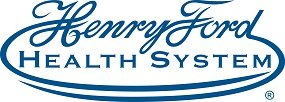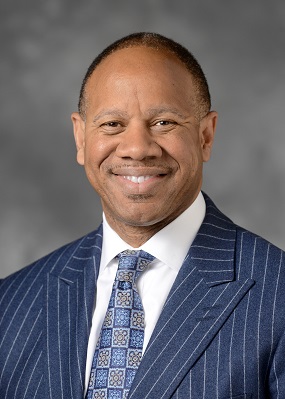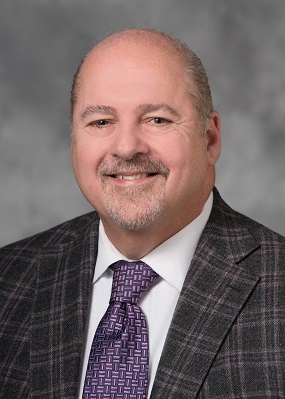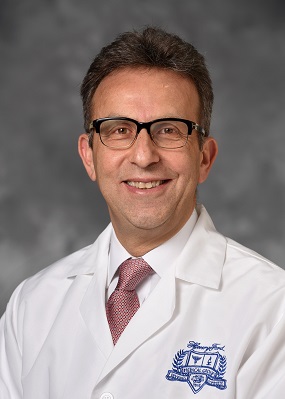Embracing A New Normal

DETROIT – Henry Ford Health System is moving to resume a full slate of services in the coming weeks with new measures in place at all of its facilities to protect the health and safety of patients, visitors and team members.
The measures reflect the new normal in the midst of the coronavirus pandemic.
As services are ramped up as part of a phasing in strategy that emphasizes safety, patients will see changes as they arrive for a radiology screening, surgery or in-person doctor’s appointment:
- All patients, visitors and team members are being screened for COVID-19 symptoms before entering the building. This includes a temperature check. Those who show possible signs of illnesses are referred for proper medical care.
- Masks are always to be worn by patients, visitors and team members. Henry Ford will provide a mask for those who need one upon entry.
- Six-foot social distancing guidelines are in place for waiting, seating and lobby areas. Elevators are limited to the number of riders that can be accommodated safely. Floor markings indicate where patients should stand in the elevators.
- Visitor restrictions continue.
- Patients scheduled for a surgery or some procedures are tested for the coronavirus.
- All facilities are undergoing rigorous disinfection and maintaining frequent cleaning schedules.
The measures apply across Henry Ford’s vast network of hospitals, outpatient medical centers, pharmacies, dialysis locations, retail eye care centers and other services in southeast Michigan and Jackson County. Senior leaders say the safety measures and phasing in strategy are the result of careful and deliberate planning to minimize the potential spread of the coronavirus.
 “The safety and well-being of our patients, visitors and team members have always been our most important priority,” says Wright Lassiter III, Henry Ford’s president and CEO. “We have strived to do everything possible to make them feel safe when they come into our facilities to receive care or to provide care.”
“The safety and well-being of our patients, visitors and team members have always been our most important priority,” says Wright Lassiter III, Henry Ford’s president and CEO. “We have strived to do everything possible to make them feel safe when they come into our facilities to receive care or to provide care.”
As more services become available, Lassiter reassured patients that they can “expect to receive the same high-level care experience they are accustomed to.”
Phasing-In Approach
While the focus was on COVID-19 patients, Henry Ford was prudent in continuing to provide patient care services in a limited or reduced way throughout the pandemic. Most patient appointments were done remotely by video through Henry Ford’s electronic health record patient portal MyChart. Video visits soared to 10,000 a week as patients embraced the option for interacting with their doctor or specialist from the comfort of their home.
Today, patient appointments continue to be managed virtually, though arrangements are under way to prioritize in-person appointments for patients based on severity of illness. More medical centers plan to resume full operations soon, and with that will come extended hours for the convenience of patients.
All nine Henry Ford emergency departments have continuously remained open as did urgent care centers. Patients are advised not to delay seeking immediate care for life-threatening situations such as chest pain, stroke and asthma attacks.
Henry Ford Maplegrove Center, a substance abuse facility for adolescents and adults, has started providing residential and detox services for a limited number of inpatients. For social distancing, all patient rooms are now private. Four Henry Ford Optimeyes super vision centers in Dearborn, Sterling Heights, Troy and West Bloomfield remain open with additional retail eye care locations scheduled to welcome back patients in early June.
 Bob Riney, president of Healthcare Operations and chief operating officer, says planning for the health system’s recovery began weeks ago at the first sign of coronavirus cases starting to stabilize and trend downward.
Bob Riney, president of Healthcare Operations and chief operating officer, says planning for the health system’s recovery began weeks ago at the first sign of coronavirus cases starting to stabilize and trend downward.
“We were very thoughtful in our planning for re-emerging from this crisis,” he says. “We developed a standardized approach that requires certain criteria to be met before a site resumes their full operations. Our guiding principle, like everything we do, is keeping our patients and our team members safe.”
It’s all part of the Henry Ford Promise to reassure the health and safety of patients.
Riney says the safety practices are likely to continue until the development of a vaccine to protect against COVID-19.
“We’re all adjusting to this new normal and it’s important for all of us not to let our guard down,” he says. “We’ll continue to assess what’s best for our patients based on science and what keeps everyone who works or comes into our buildings the safest.”
During its planning process, the health system also took steps to help patients who are facing economic hardship due to the pandemic and worry about mounting medical bills. Financial relief options are available through Henry Ford Bill Pay and collection practices have been suspended.
Surgery Leads the Re-Emergence
Since the pandemic’s onset, Henry Ford performed only a limited number of surgeries, prioritizing life-threatening and critical procedures. This resulted in about 8,000 procedures being postponed. On April 17, the health system resumed time-sensitive surgeries and procedures for certain medical conditions like heart disease and cancer and spinal injuries.
 Since then, surgery departments created a tiered approach for rescheduling the 8,000 procedures based on conversations between surgeons, nurses and their patients and assigning an urgency or priority score to each case. Those procedures are all expected to be rescheduled by the end of June, says Adnan Munkarah, M.D., executive vice president and chief clinical officer.
Since then, surgery departments created a tiered approach for rescheduling the 8,000 procedures based on conversations between surgeons, nurses and their patients and assigning an urgency or priority score to each case. Those procedures are all expected to be rescheduled by the end of June, says Adnan Munkarah, M.D., executive vice president and chief clinical officer.
Some cases are being scheduled for Saturdays, even Sundays when necessary.
“We never stopped performing live-saving surgeries for those who needed it the most,” Dr. Munkarah says. “What we’re finding now is that a condition that wasn’t considered time sensitive or urgent in March has now become more urgent. At the same time, we have new patients coming in with conditions that have to be scheduled.”
Dr. Munkarah cited a recent heart transplant, two liver transplants and multiple craniotomies to highlight the expertise and complexity of surgeries performed at Henry Ford Hospital, a Level 1 trauma center.
As part of the new safety practices, all surgery patients undergo COVID-19 testing prior to their procedure. Results are returned in just a few hours. To date, all surgery patients have tested negative. In addition, pre-op and post-op surgery areas have been revamped to honor social and physical distancing.
Operating rooms by their very nature are highly sterilized areas and patients can take comfort in that, Dr. Munkarah says.
“Our teams are prepared,” he says. “Other than the physical distancing and testing, patients won’t notice any other major changes.”
As Henry Ford’s re-emergence continues to unfold, Riney believes the “prudent and thoughtful approach” taken to manage the pandemic well-positions the health system moving forward.
“We’ve been open and operational throughout this crisis and that’s a reflection of our entire workforce,” he says. “We’re very proud of our frontline team members for their courage and resilience working under trying conditions. The support from the community has been overwhelming and we’re so grateful for the donations of food, PPE supplies, cards, well wishes and monetary contributions.
“This pandemic has tested us in many significant ways, but we have weathered this storm. We are ready for the new normal and what that brings ahead.”
###
MEDIA CONTACT: David Olejarz / David.Olejarz@hfhs.org / 313.874.4094
.svg?iar=0&hash=F6049510E33E4E6D8196C26CCC0A64A4)

/hfh-logo-main--white.svg?iar=0&hash=ED491CBFADFB7670FAE94559C98D7798)









